The baby food aisle is bursting with products, and “toddler formula” is one that deserves some explanation. We’ll talk through what it is, why it’s different from infant formula, all about toddler milks, and what the heck your child should really be drinking.
Toddler Formula
Powder labeled “toddler formula” seems like the next step in infant feeding and is marketed toward babies 9-36 months old. They are generally not recommended by medical experts and the product labels can be confusing. You may also find these formulas called “transitional formula” or “toddler milk,” the latter being marketed toward kids 12-36 months.
The American Academy of Pediatrics recommends that once a child reaches 1 year of age, they transition to cow’s milk, assuming they’re eating a mix of other solid foods.
If your toddler has a medical issue or there’s a concern about growth or nutrition, consult your pediatrician about whether a toddler formula may be necessary because it might be very helpful in that case.
Toddler Vs. Infant Formula
Formulas labeled for toddlers are a nutritional drink as they contain a slightly different mix of ingredients, vitamins, minerals, and nutrients than infant formula and are usually designed for babies 9 months old and up.
They are not regulated by the FDA the same way as infant formulas are, though, so they may contain more sugar, fat, and sodium than you may expect. And the claims and labels may confuse us into thinking that our kids actually need them—especially if they are “picky eaters.”
TIP: Almost all toddlers are picky at some point and milk or formula shouldn’t be used as a supplement or safety net. Read more on Normal Picky Eating here.
Organic Formula for Toddlers
And formula labeled “organic” is simply made with organic ingredients. It’s otherwise similar to regular toddler formula and may not be necessary if your child eats a well-rounded diet most days—or over the course of a week or month.
Kids tend to eat more balanced that we realize if we zoom out and look at a longer period of time.
What’s “Toddler Milk”?
Marketed toward kids 12-36 months old, toddler milk is typically billed as a safety net for picky eating. It’s not recommended by medical experts, and some public health experts worry that the labels are confusing and misleading.
It’s also more expensive than regular whole milk.
Unless your pediatrician or healthcare provider advises otherwise, you can save your dollars and skip this product.
Best Milk for Toddlers
Once a child is over 1 year of age, their digestive system can handle cow’s milk. (Before they turn 1, they cannot tolerate it in large doses, so it’s best to stick with breastmilk or infant formula in bottles or cups.)
Whole cow’s milk has all the fat your child needs for proper brain development, as well as protein, calcium, and vitamin D. But it’s possible to go with an alternative milk for preference, lactose intolerance, or dairy allergy. You might have to find the right one.
Read more on the Best Milks for Toddlers, including information on plant milks and soy milk.
How do I know if my toddler is ready to wean from formula?
When a toddler turns 1, you can start the process of weaning from infant formula to regular milk. You can start gradually, doing half milk and half formula in bottles to make sure they tolerate it OK and adjust to the taste difference.
Since most kids at this age are eating a wide range of foods, they don’t need the safety net of formula for nutrition.
TIP: Read more on How to Wean a Toddler and tips for Night Weaning.
Best Tips for Toddler Drinks
- For young children, stick with mainly water, whole milk, or homemade drinks such as smoothies—or plant-based milk with nutritional similarities to whole milk such as soy milk.
- Use breastmilk as long as works for your family.
- Once a child turns 1, it’s recommended by the AAP that they move from formula to whole dairy milk, as their nutritional needs have changed. You don’t need to invest in toddler formula unless it’s specifically recommended by your child’s pediatrician.
- If there are food allergies that limit the type of milk a child can tolerate, consider goat milk, plant milk with pea protein, or soy milk.
- If buying alternative milks, look for one that’s unsweetened and made without added sugars or sweeteners.
Related Recipes
I’d love to hear your experience with formula or milk for toddlers, or if you have any questions, so please chime in below in the comments!
This post was first published September 2019.
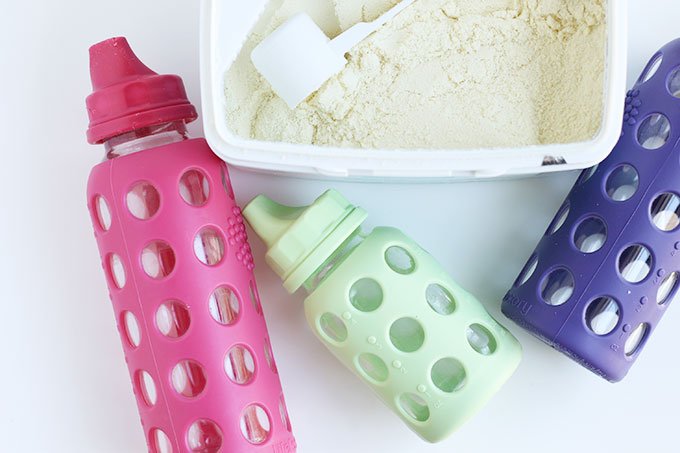
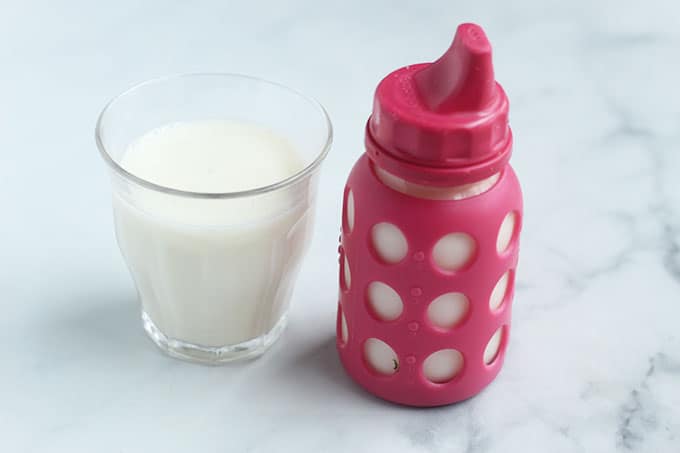

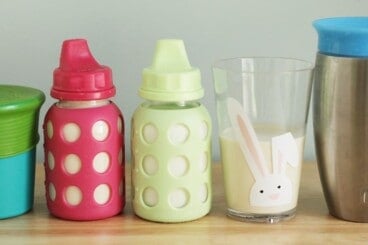



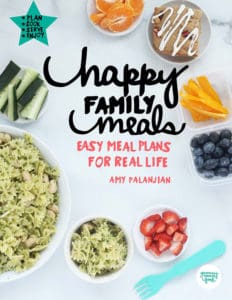

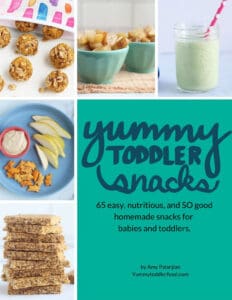











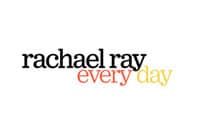


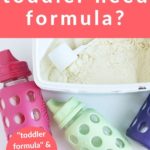
My 16mo refuses whole milk, soy milk, and other milk alternatives so we moved her from formula to toddler milk after she turned 1. Any suggestions on what we can do in this scenario?
My baby, now one year old, has been on Nutramigen for cows milk protein allergy since he was 6 weeks old. We thought he had outgrown the allergy when he was able to tolerate ice cream, pudding, and other milk products. However, after attempting to switch to whole cows milk, all the same problems came back including eczema skin flare ups. We tried almond milk which worked well, but our family doctor doesn’t feel he is getting the fat content he needs for brain development that is usually provided by whole milk. Is there enough fat in almond milk or is there a different type of milk I can try that would be appropriate, or just go to Nutramigen toddler formula?
Generally speaking, soy milk or a plant milk that’s fortified with pea protein (like Ripple brand or Silk Protein Milk) would have the fat and protein more similar to cow’s milk than almond milk.
My 17 month old has cow milk allergy and I need something as a transition from breast milk to no milk/milk substitute and am thinking of infant or toddler formula. Any suggestions?
Is there a reason you don’t want to go right to the milk substitute? You could go to soy milk or an unsweetened other plant milk, which would probably be less $$—unless there’s an issue with eating or growth that you are wanting to try to compensate for. That said, if you want to use a formula, I’d probably go with a toddler one simply based on the age.
Thank you for responding ❤️ Sorry, I should have clarified. I live in a country where finding milk substitutes is very difficult. In fact, even the formula will be sent by family from the US or UK/UAE etc depending on everyone’s travel plans. The reason for formula is purely a logistical one since it has a shelf life that I need.
So I have a question. I mainly have stuck to toddler formula because when we travel or go out, whole milk can be hard to come by and storing it can be a pain. How do you deal with this? We will be headed out for an over weeklong plane trip with my 14 month old.
If it’s easier for traveling, by all means go with it. Are you asking about keeping it ongoing at home so it’s familiar when you travel?
Amazing article, thank you very much for sharing.